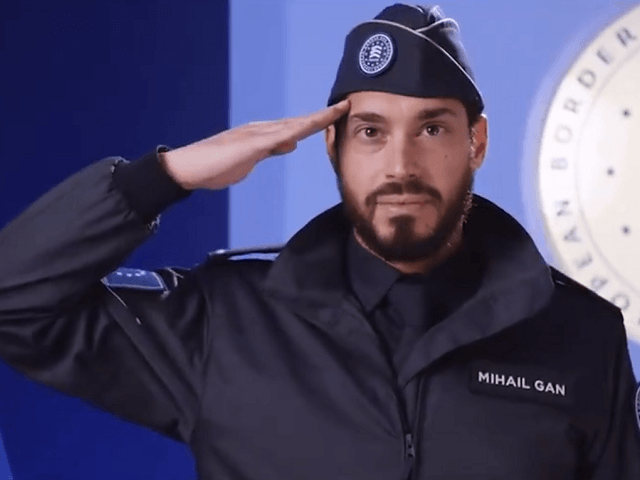Less than seven years after British Eurosceptics were laughed at for expressing concerns about a coming European Union army, the bloc has revealed the official uniform of its new ‘standing corps’, as the first of 10,000 recruits prepare to deploy to the field.
Frontex, the European Union’s combined border force and coastguard, revealed the new uniform in a social media post on Monday, showing off the navy uniform complete with EU-flag identification patches and military side cap. The force said: “For the first time, the European Union has its own uniformed service – the European Border and Coast Guard standing corps.”
Previously, officers seconded to Frontex from national forces denoted their new role by wearing an armband with a symbol of the European political project — a ring of gold stars on blue — on their right arm.
The “troops” of Frontex in their own European uniforms comes less than seven years after Brexiteers were told they believed a “dangerous fantasy” for saying the European Union was moving towards having its own armed forces — of which the paramilitary Frontex is the first phase.
The so-called standing corps recruited its first inductees during 2019, who were sent to academies in Poland for training. According to reports at the time, the first Frontex standing corps officers are due to deploy in early 2021.
While the first wave of recruitment expanded Frontex past 1,000 “civilian troops wearing a European uniform”, by the EU’s own reckoning they intend to expand the force to 10,000 “operational staff” by 2027.
Frontex executive director Fabrice Leggeri said in 2019 of the force that its officers would be armed, and “be able to deploy to an EU member-state and exercise executive powers such as carrying out border controls”.
The European Union has long operated military forces and organised foreign deployments, although they have been comprised of military units on loan from member states working under EU command, rather than new uniformed personnel in EU uniform and reporting directly to Brussels. EUNAVFOR’s Operation Atlanta has seen EU warships and aircraft operating in the Indian Ocean continuously for 12 years, with participating personnel and ships wearing the EU’s blue and gold flag.
In other cases, soldiers from EU member state’s armies have worn identifying patches with the EU flag, and even blue cravats for ceremonial work.
While the paramilitary police-style Frontex is the European Union’s first uniformed armed service, it seems unlikely to be the last. European leaders frequently discuss the need for a combined European conventional armed forces, with EU Commission boss Ursula von der Leyen — the former German defence secretary before she went to Brussels — calling for “credible military capabilities” in 2020.
She said at Davos: “There is a European way to foreign policy and foreign security policy where hard power is an important tool”. In 2019, she boasted that “Europe’s army is already taking shape”. Indeed, in 2019 the EU already had 47 joint defence projects underway, including a joint fleet of warships, electronic warfare systems, and airborne refuelling aircraft.
French President Emmanuel Macron hit a similar note in 2018 when he said the EU needed its own armed forces to “protect ourselves” from external threats. Incredibly, among the threats Macron listed was the United States of America — prompting President Donald Trump to call the claim “very insulting”.
The advancing state of European Union militarism is surprising, perhaps, given the strong terms in which the claims that plans were on the table were dismissed, or simply laughed off, by pro-Brussels EU loyalists in the pre-Brexit vote era. Then-Deputy Prime Minister Nick Clegg, one of the chief cheerleaders for the EU in Britain — and now a top Facebook executive after the unceremonious end of his political career — infamously belittled Nigel Farage on stage during a debate in 2014, accusing him of holding a “dangerous fantasy” when the Brexit leader cited a future EU army.
At a one-hour BBC debate on the future of Britain’s membership of the European Union, Farage pointed out Mr Clegg’s record on Europe, saying: “The whole point of the [EU] constitution, which you supported, was to make the European Union an economic and a military superpower. And now you deny the fact they are trying to build a European airforce.”
Clegg attempted to hit back with a line that would come to be repeated through the Brexit campaign as an example of the haughty disdain the Westminster elite held voters in, when he said: “No, no, no… it is a dangerous fantasy. It’s just not true! I want to explain the truth and reality, not this fantasy world you keep talking about that simply doesn’t exist.”
While Clegg was subsequently proven wrong time and time again with following pronouncements from EU leaders on wanting an independent EU army, he still wanted the last word. An opinion piece in 2017 — three years after the original debate, and after Britain had voted to leave the EU — the then-former deputy PM insisted he’d been right all along, stating “EU troops in starred fatigue? Not so much”.

COMMENTS
Please let us know if you're having issues with commenting.